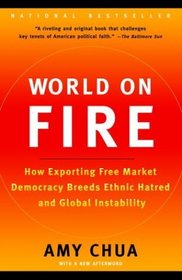Amy Chua is quite a provocative writer. I'm not sure I buy her thesis as expounded in this book. But I do think that it's a mistake to think their is such a thing as "one size fits all" democracy.
Her latest book, Battle Hymn of the Tiger Mother, is getting a huge amount of press at the moment.
Her latest book, Battle Hymn of the Tiger Mother, is getting a huge amount of press at the moment.
Rebecca S. (beccals) reviewed World on Fire : How Exporting Free Market Democracy Breeds Ethnic Hatred and Global Instability on + 44 more book reviews
A professor at Yale Law School, Chua eloquently fuses expert analysis with personal recollections to assert that globalization has created a volatile concoction of free markets and democracy that has incited economic devastation, ethnic hatred and genocidal violence throughout the developing world. Chua illustrates the disastrous consequences arising when an accumulation of wealth by "market dominant minorities" combines with an increase of political power by a disenfranchised majority. Chua refutes the "powerful assumption that markets and democracy go hand in hand" by citing specific examples of the turbulent conditions within countries such as Indonesia, Russia, Sierra Leone, Bolivia and in the Middle East. In Indonesia, Chua contends, market liberalization policies favoring wealthy Chinese elites instigated a vicious wave of anti-Chinese violence from the suppressed indigenous majority. Chua describes how "terrified Chinese shop owners huddled behind locked doors while screaming Muslim mobs smashed windows, looted shops and gang-raped over 150 women, almost all of them ethnic Chinese." Chua blames the West for promoting a version of capitalism and democracy that Westerners have never adopted themselves. Western capitalism wisely implemented redistributive mechanisms to offset potential ethnic hostilities, a practice that has not accompanied the political and economic transitions in the developing world. As a result, Chua explains, we will continue to witness violence and bloodshed within the developing nations struggling to adopt the free markets and democratic policies exported by the West. (On sale Dec. 24)
Copyright 2002 Reed Business Information, Inc.
Copyright 2002 Reed Business Information, Inc.





